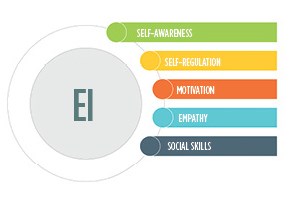How Emotional Intelligence Helps Sustain a Workforce — Part 2
The lack of available skilled workers is an ongoing issue. A leader with Emotional Intelligence can leverage those skills to keep the workers they have.
#workforcedevelopment #pmpa

You have great employees and they are doing their job well. You know that it is easier and cheaper to keep a good employee than to find one. So how does Emotional Intelligence (EI) help you keep those good employees? Emotional Intelligence is the ability to be aware and manage your own emotions, plus the ability to be aware of the emotions of others. For some, this is an innate skill. However, EI is a skill and skills can be learned.
Emotional Intelligence Skills
According to Daniel Goleman, an American psychologist and author of Emotional Intelligence: Why It Can Matter More Than IQ, there are five elements to explore: self-awareness, self-regulation, motivation, empathy and social skills.
Featured Content
Self-awareness. Self-aware people know how they feel and are also aware of how their actions affect others. The key to self-awareness is being honest with yourself. We all have strengths and weaknesses, and knowing what yours are can help you recognize your emotions and how you react to situations.
Self-regulation. Self-regulation is about controlling your emotions. Effective, self-regulated people rarely yell, rush to a decision or pigeonhole people. The key to self-regulation is accountability. If you make a mistake, own it and don’t pass on blame. You may be amazed at the respect your employees will have for you when you admit you made a mistake. Another skill to practice is being calm in heated situations. Try taking a breath before reacting.
Motivation. Remind yourself why you do your job. Remember the people you are helping by making parts they need for their everyday lives or to save their lives. Try to see the good in people and in their actions. If you are positive and motivated, your employees will see that and emulate it.
Empathy. This is where the phrase “walk in another person’s shoes” applies. Empathy is the ability to understand another person’s perspective. Empathy shows your employees you care. The pandemic has been a great opportunity to show empathy. Everyone reacts differently to the fear of getting COVID-19. For some, they are high risk; for others, they care for someone who is high risk. Or perhaps they don’t completely understand or are listening to fake news which is elevating their fear. Or they can’t afford to lose a day’s pay. A person’s body language, facial expressions and tone of their voice can give clues as to how they are feeling.
Social skills. People with social skills can effectively resolve conflict, show support and listen well. Conflict is inevitable, so learning how to resolve conflict is essential. Showing support to your employees can go a long way — even a quick mention of a job well done is appreciated. And when an employee is talking, it is important to listen. Being open to hearing what your employees have to say and giving them a voice will be valued.
About the Author
Carli Kistler-Miller
Carli Kistler-Miller, MBA, has over 20 years of experience with communications, event/meeting planning, marketing, writing and operations. Email cmiller@pmpa.org at PMPA.
RELATED CONTENT
-
Inventory Control Systems For The Shop
An ongoing effort towards more efficient operations drove this shop to take a closer look at indirect material usage, subsequently leading to implementation of a new system for tracking toolroom inventory.
-
Winning New Jobs With Online Bidding
The digital revolution is hitting the business of the multiple-spindle automatic machining--in two distinct forms, no less. Twenty-five years after the first wave of digitization in manufacturing (numerical control) its linear descendant, computer numerical control or CNC, is changing the way screw machine shops do business.
-
Communication: Motivating Employees To Work In The Best Interest Of The Business
Fair treatment is all most employees ask of their employers. Showing both family and non-family employees what is fair and having open lanes of communication allow for a healthy exchange of what constitutes equitable treatment. Effective communication between management and employees on important issues, such as compensation and firm strategy, needs to take place to maintain a motivated and enthusiastic workforce.






